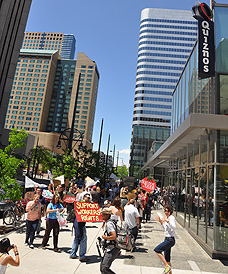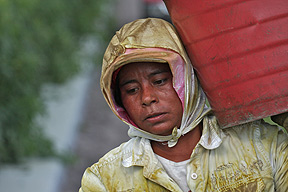
Denver Fair Food crew to Quiznos: “We will not rest,” until it’s over…
In an abrupt about-face, Denver-based Quiznos (the second-largest sandwich restaurant in North America, after Subway), has gone from being one of the last fast-food holdouts against the Campaign for Fair Food to being on the verge of throwing its considerable weight in tomato purchases behind a partnership with the CIW for better wages and fairer conditions in Florida’s tomato fields.
This encouraging news was first reported yesterday on the food blog “Slashfood”, in the wake of a spirited — and positive — action by the Denver Fair Food Committee the day before (the picture above, taken outside Quiznos downtown Denver headquarters, is from the Tuesday action). Here’s an excerpt from the Slashfood article, entitled “Quiznos Seeks Fair Wage for Tomato Pickers Amid Protest,” 5/26/10:
| “… Specifically, Quiznos will pay an additional penny per pound of Florida round tomatoes it buys, starting with the 2010 growing season, and it is asking suppliers to ensure that additional penny be paid to the farm workers. Workers are currently paid between 40 and 50 cents per 32-pound bucket of tomatoes, according to Denver Fair Food.
“We care very much about the end result of this which is the humane treatment of the workers,” Quiznos spokeswoman Ellen Kramer told Slashfood. In addition to the penny-per-pound pay increase, Quiznos wants to verify that money is getting to the right place — from suppliers to growers to the pickers its intended to help, Kramer told Slashfood.” [CIW] also wanted to ensure that our code was being complied with, so they’re trying to set up a verification system on their end and want us to support their verification system. It doesn’t appear to be like there are differences between what they want to accomplish and what we want to accomplish,” Kramer said. Quiznos is asking produce suppliers to work with the CIW on increasing farm worker participation in monitoring supplier compliance, investigating complaints and resolving disputes. Kramer said the company did not have an official agreement with the Coalition because the group’s lawyers had not yet approved one, but that the organizations were talking…” |
Denver Fair Food did their usual excellent work on their own blog to capture the energy and spirit of the action. Don’t miss their great write-up.
Here at the CIW, we are heartened by the latest developments at Quiznos. But at this particular juncture, we would sound one important note of caution. If there’s one lesson we have have learned from this first season of implementation of the Fair Food agreements, it’s this: The most important ingredient in Fair Food is partnership.
There are a million and one challenges to effecting justice in the agricultural industry. Food industry supply chains are infinitely complex (just look at how difficult it is to trace produce when there are people dying from a food-borne illness outbreak). And old habits — habits that created the human rights crisis in the fields today — are hard to break, from the farm to the boardroom.
The only way it is possible to overcome all those challenges is if the partnership with the end buyer is real, and that starts with a signed agreement coupled with an enforceable code of conduct.
There is no golden road to a fairer food industry for farmworkers, but to the degree that buyers and farmworkers are entered into a true partnership, it is possible to make your way over, under, or around the obstacles along the way.
All of Quiznos’ recent moves are in the right direction, no doubt. But there’s still some important ground to be covered, and that ground is best traveled together. We look forward to working with Quiznos towards forging a true partnership for change.
